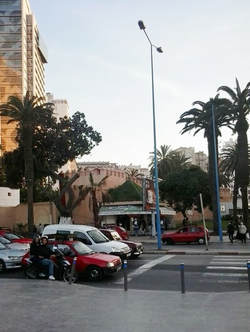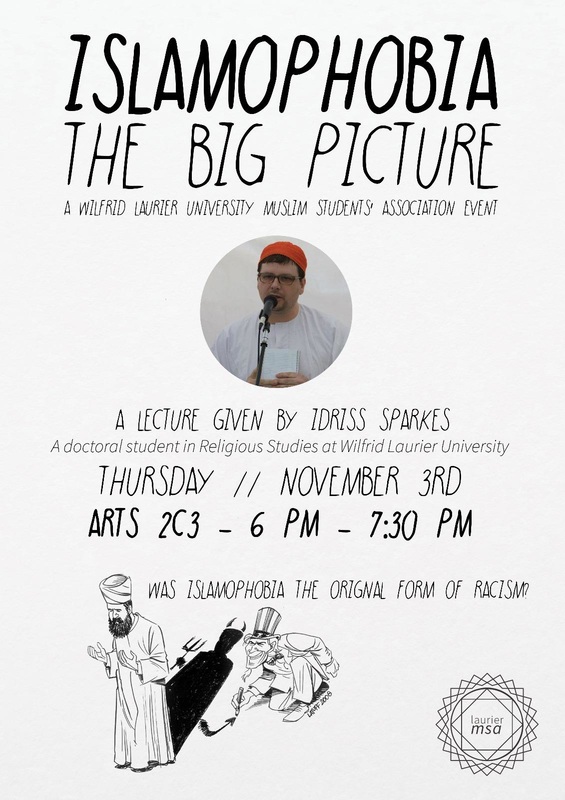 I am honoured to be teaching this summer course in Morocco with my mentor and friend, Professor Ali Zaidi. It is a full-credit course for Laurier University undergraduates , offered jointly by the Global Studies Department and the Department of Religion and Culture. Overview: Spring 2019, May 20-24 at Laurier June 1-18 in Morocco Stay in the capital, Rabat Take excursions to Casablanca, Tangiers, Fez, Meknes, and UNESCO sites Experience Ramadan and Eid during 5-day homestay Witness the effects of coloniality, capitalism and the refugee-crisis
0 Comments
There are still some places left in the course I will be teaching next winter (in sha Allah), but I am glad to see it is filling up fast. I am really happy to be teaching this course. I think teaching intro level courses is a really important part of an academic's tasks. These courses can lay the foundations of so much in the lives of the learners. It was an intro to Islam course taught by my dear mentor Sheila McDonough nearly three decades ago that opened the way to my becoming a specialist in Muslim Studies.
Here is the description from the Laurier University website: MZ200 Introduction to Muslim Studies 0.5 Credit This course provides an overview of the aims, methods, and central issues in the Muslim Studies field. In particular it will investigate the diversity of contemporary Muslims, ideational currents that are influencing them, and the major debates about Islamic identity. I am presenting a paper today at the 2017 Annual Meeting of the CSSR, part of the broader Congress of the Federation for the Humanities and Social Science, held this year at Ryerson University in Toronto.
Title of presentation: Decolonizing Canadian Diversity: A View from the Internal Muslim Periphery Abstract: This paper examines human diversity in Canada from a decolonial Muslim perspective. First, it examines the thought of Ramón Grosfoguel (UC Berkeley, Ethnic Studies). He contends that while post-colonialism represents a Eurocentric critique of Eurocentrism, decolonialism adopts peripheral epistemologies to critique the modern/colonial world-system. Grosfoguel challenges Muslim academics like the author of this paper to think critically from an Islamic perspective rather than simply to think about Islam. Second, this paper applies Grosfoguel’s framework to Canadian Muslims, situating them as one of many peripheral minorities living in the core of the world-system. Eurocentric depictions divide Muslims into anti-modern fundamentalists and progressive modernists. Unfortunately, many Muslims adopt these categories. Instead, this paper argues that Canadian Muslims must reject such binaries and draw upon the dynamic, adaptable, and pluralistic dimensions of their tradition to help build a decolonial future, in solidarity with other peripheral communities, from far and wide. I am scheduled to participate in a a multidisciplinary panel of undergraduate and graduate students during the Religion and Culture collaborative student colloquium, “Cultural Appropriation/Cultural Representation.” As a convert to Islam who spends most of his time with North Africans, this is an issue I think about a lot. I look forward to exploring it with my peers.
Date: Fri Jan 20, 2017 Time: 12:00 – 1:20 p.m. Place: The Paul Martin Centre at Wilfrid Laurier University. This is the name of the paper I will present insha Allah at the Institute of Islamic Studies Student Council Graduate Student Symposium at McGill University in good old Montreal. The symposium lasts from April 28 to 29. I am scheduled to present at 11:15 on Friday 29. Here is the link for the symposium: https://sites.google.com/site/miisscsymposium/2016-symposium/preliminary-program
Here is the abstract for my paper: This paper explores the intersection between decolonialism and Islam in contemporary scholarship. It is inspired by the work of ethnic studies professor Ramón Grosfoguel (UC Berkeley). The first section introduces decolonialism as a type of world-systems analysis produced from peripheral epistemologies. Grosfoguel argues that this is different from postmodernism and postcolonialism, which remain epistemically Eurocentric critiques of Eurocentric modernity. For scholars of Islam, decolonialism entails responding to the problems facing humankind today as Muslims or with Muslims, rather than simply producing scholarship about Muslims. It entails considering Islam an epistemic perspective from which to actively generate critical thought, rather than a passive object of study. Moreover, decolonialism engages in inter-epistemic ‘pluriversal’ communication, and seeks to avoid Eurocentric universalism, Islamic takfiri discourse, and other forms of exclusivism. The second section examines Grosfoguel’s contention that epistemic Islamophobia is a constitutive element of the “modern/colonial capitalist/patriarchal western-centric/Christian-centric world-system.” He argues that modern social sciences and globalized structures of knowledge are deeply rooted in the four genocides/epistemicides of the long sixteenth century (against Jews and Muslims in Al-Andalus, indigenous peoples in the Americas, African victims of the transatlantic slave trade, and European women accused of sorcery). The third section discusses the contributions to decolonial Muslim thought by three intellectuals from Berkeley, California. After further consideration of Grosfoguel’s work, Hatem Bazian is introduced. He is a co-founder of Zaytuna College, the first accredited Muslim liberal arts college in the United States, where he works as a professor of Islamic law and theology. Furthermore, he lectures on Islam in America and Islamophobia at UC Berkeley. Dustin Craun, the third figure to be discussed, is an anti-racist educator, communications consultant, editor, and writer. He is also the founder and CEO of Ummah Wide, a San-Francisco based digital media and film production start-up focused on Muslim issues. C'est le titre d'une présentation que je donnerai dans le cadre d'un atelier au CEETUM (Centre d’études ethniques des universités montréalaises) à Montréal.
I will be presenting a paper at the graduate symposium of the CEETUM (Centre d’études ethniques des universités montréalaises) in Montreal. Voici les coordonnées : Here is the information for the workshop: Salle 530-1-1 Atelier 12 (1re partie) Islam, islamophobie et migrants musulmans 18 mars, de 9 h à 11 h (partie 2 de 11 h 15 à 13 h) Colloque « Conversion, identité, ethnicité »
Congrès de l’ACFAS 2013 Université Laval, Ville de Québec http://www.acfas.ca/evenements/congres/programme/81/400/476/c Titre de ma présentation : La conversion à l’islam par un Occidental est-elle un acte de décolonialisme épistémique? Résumé : La conversion à l’islam par un Occidental représente forcément un repositionnement épistémique à contre-courant de la pensée européocentrique moderne dominante. Elle place l’individu en périphérie de l’ordre mondial moderne et colonial, favorisant par ce fait même un positionnement critique et décolonial. Cette communication aura pour objectif d’explorer les aspects décoloniaux de la conversion à l’islam par des Occidentaux. Tout d’abord, il y aura un résumé de la contribution de Ramón Grosfoguel (UC Berkeley), qui démontre comment l’ordre mondial européocentrique et colonial est légitimé par une épistémologie raciste. Ensuite, il sera question de la comparaison, selon Grosfoguel, des approches postmodernes, postcoloniales et décoloniales. Tandis que les deux premières sont des critiques européocentriques de l’européocentrisme, le décolonialisme considère les épistémologies périphériques comme sources de connaissances plutôt que comme simples objets de connaissances. Enfin, la conversion à l’islam en milieu occidental sera considérée comme acte de décolonialisme épistémique. Cette réflexion sera entreprise à l’aide de citations de convertis musulmans occidentaux forts critiques de l’ordre mondial européocentrique, comme le métaphysicien français René Guénon (m 1951) du militant américain Malcolm X (m 1965) et du rappeur français contemporain Kery James. Suite à la conference du 4 avril, présentant une analyse décoloniale soufie de l'interdisciplnarité, certains participants m'ont demandé de mettre la bibliographie de la conférence en ligne. La voici donc :
Al-Burhânî, Muḥammad 'Uthmân 'Abduh. 1970. Intiṣâr awliyâ' al-Raḥmân 'alâ awliyâ' al-Shayṭân (La victoire des saints de Dieu sur les saints Satan). Khartoum: Tariqa Burhaniya Disuqiya Shadhuliya. Césaire, Aimé. 1955. Discours sur le colonialisme. Paris: Présence africaine. Dussel, Enrique. 1996. The Underside of Modernity : Apel, Ricoeur, Rorty, Taylor, and the Philosophy of Liberation. Translated by Eduardo Mendieta. Atlantic Highlands: Humanities Press. ---1995. The invention of the Americas: Eclipse of "the Other" and the Myth of Modernity. Translated by Michael D. Barber. New York: Continuum. Elyas, Amal. 2005. Arwah Abiya from the Arabian Peninsula: A Narrative Inquiry of Seven Women with Fiery Resistor Spirits University of Victoria, Victoria, Canada. Geoffroy, Éric. 2009. Le soufisme : voie intérieure de l'islam. Paris: Points. Grosfoguel, Ramon. 2011 - "Decolonizing Post-Colonial Studies and Paradigms of Political-Economy: Transmodernity, Decolonial Thinking, and Global Coloniality." Transmodernity: Journal of Peripheral Cultural Production of the Luso-Hispanic World 1 (1) http://www.escholarship.org/uc/item/21k6t3fq. ---2010 - "Epistemic Islamophobia and Colonial Social Sciences." Human Architecture: Journal of the Sociology of Self-Knowledge 8: 29-38. ---2006 - "The Long-Durée: Entanglement Between Islamophobia and Racism in the Modern-Colonial Capitalist/Patriarchal World-System." Human Architecture: Journal of the Sociology of Self-Knowledge V(1):Fall. 2006 - "Les implications des altérités épistémiques dans la redéfinition du capitalisme global." Multitudes (3): 51-74. Geoffroy, Éric. 2010. Abd el-Kader, un spirituel dans la modernite. Beyrouth: Dar Albouraq. Morin, Edgar, Basarab Nicolescu, er Lima de Freitas. Charte de la Transdisciplinarité. Centre International de Recherches et Études Transdisciplinaires 1994 [http://basarab.nicolescu.perso.sfr.fr/ciret/chartfr.htm. Nasr, Seyyed Hossein. 2007. The Garden of Truth : The Vision and Promise of Sufism, Islam's Mystical Tradition. New York: HarperOne. Nishitani, Osamu, 2006. "Anthropos and Humanitas: Two Western Concepts of." Translation, biopolitics, colonial difference no. 4. Schimmel, Annemarie. 1975. Mystical Dimensions of Islam. Chapel Hill: University of North Carolina Press. Tariqa Burhaniya, 2012 - Discours annuels du Cheikh de la Tariqa http://www.Burhaniya.org/speechs.htm (en arabe), http://www.burhaniya.info/intranet/french/discours.html (en français) et http://burhaniya.info/intranet/I_welc_e.htm (en anglais) Tlostanova, Madina et Walter Mignolo. 2012. Learning to Unlearn: Decolonial Reflections from Eurasia and the Americas. Ohio State University Press. |
AuthorTransdisciplinary scholar of Islam and Sufism. Archives
March 2023
Categories
All
|

 RSS Feed
RSS Feed
